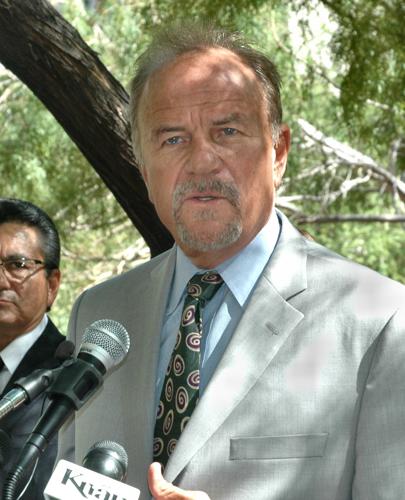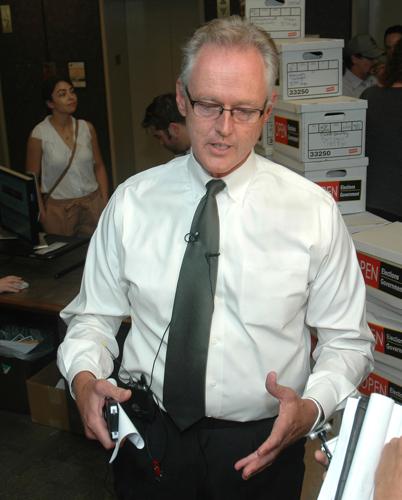PHOENIX ŌĆö Two former politicians are moving to overturn the decision by the Republican-controlled Legislature to make it more difficult for citizens to propose their own laws.
Grant Woods, who was a Republican attorney general, and former Phoenix Mayor Paul Johnson filed the paperwork Thursday to create Voters of ├█Ķųų▒▓ź. That allows them to start circulating petitions, perhaps as early as this coming week, to seek voter rejection of the new laws that restrict initiatives.
Backers need 75,321 valid signatures by early August to block the measures from taking effect until at least the November 2018 general election. It would then be up to voters to decide whether to ratify or veto what lawmakers approved.
But campaign consultant Joe Yuhas said the efforts wonŌĆÖt be limited to the streets.
ŌĆ£We will also simultaneously pursue litigation,ŌĆØ he told Capitol Media Services. He said some provisions of what lawmakers approved appear to be unconstitutional.
People are also reading…
Yuhas said, though, referring the measures to the ballot remains the ultimate remedy.
He said a majority of ├█Ķųų▒▓źns do not support the changes.
ŌĆ£Since statehood, ├█Ķųų▒▓ź voters have had the cherished right to enact their own laws through the direct democracy process,ŌĆØ Yuhas he said. ŌĆ£These bills are designed to decimate that process.ŌĆØ
And he said anyone who doubts the views of ├█Ķųų▒▓źns should recall the approval in 1998 of the Voter Protection Act, an initiative that specifically bars lawmakers from tinkering with what has been approved by the ballot.
There will be at least two referenda.
The first seeks to void a law that would make it a crime for initiative proponents to pay people on a per-signature basis. Proponents argued that creates opportunities for fraud.
But that change does more, declaring that any otherwise valid signatures gathered this way are void and will not be counted. It also expands who can challenge initiative petitions.
A second measure foes are trying to quash requires judges to disqualify any initiative drive where there has not been ŌĆ£strict complianceŌĆØ with each and every election law. That is a major change from the current law that says petitions are considered valid if they are in ŌĆ£substantial complianceŌĆØ with the law.
Yuhas said he anticipates a broad-based coalition of groups who have a good reason to quash efforts by lawmakers to restrain the initiative process: those who have used it before when the Legislature ignores their proposals.
├█Ķųų▒▓ź has many laws on its books solely because of voter-proposed initiatives.
For example, smoking is banned in restaurants because voters wanted the change. It also is illegal to use leghold traps on public lands, confine breeding pigs to tiny crates and engage in cockfighting.
But Yuhas said the initiative has not just been a tool of liberal interests.
He pointed out that foes of same-sex marriage were able to put their own proposal on the ballot and get it approved in 2008. And ├█Ķųų▒▓ź has a law on the books about voter identification at the polls because of a different initiative.
All that, Yuhas said, should cause foes of what the Legislature has done to unite.
But Cathi Herrod, president of the Center for ├█Ķųų▒▓ź Policy, which sponsored the initiative against same-sex marriage, said referendum proponents should not count on her backing.
ŌĆ£I support the right of citizens to petition the government,ŌĆØ she said. But Herrod said she also backed the changes approved by the Legislature.
ŌĆ£The initiative process and law should be followed,ŌĆØ she said, saying thatŌĆÖs precisely what requiring strict compliance is designed to do.
The petition drives will likely need broad backing, both political and financial, as the business groups that successfully got lawmakers to put new curbs on the initiative process are likely to do whatever they can to kill the effort.
Yuhas said the petition drive and ballot referral wonŌĆÖt be necessary if judges agree that what lawmakers approved violates provisions of the ├█Ķųų▒▓ź Constitution, which spells out that voters have the same rights as legislators to enact their own laws.
He said, though, the petition drive is necessary because it is possible there would not be a ruling on such a challenge before that 90-day window after the end of the session to file the paperwork.
The exact deadline for filing the petitions has yet to be determined. ThatŌĆÖs because the constitution gives those seeking to refer anything approved by the Legislature 90 days after the end of the session. And that has not yet occurred.
On Twitter: @azcapmedia











